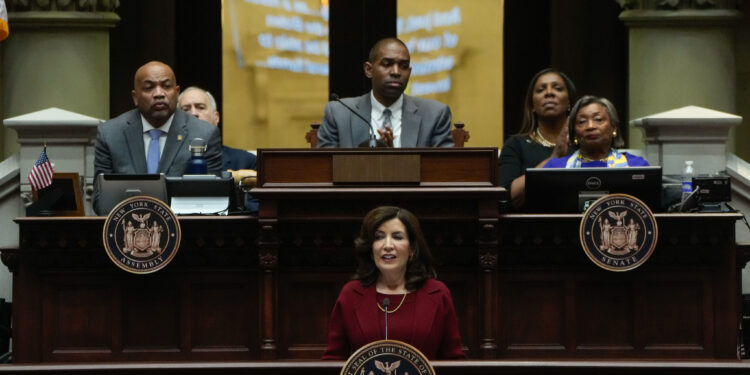Governor Kathy Hochul’s recent decision to indefinitely pause the implementation of congestion pricing in New York City has garnered widespread support from suburban voters, according to a new Siena College poll.
The poll shows that 56% of suburban voters, including those from Long Island and counties like Westchester, Putnam, and Rockland, are in favor of the governor’s last-minute pause on the $15 daily toll for drivers entering Manhattan below 60th Street.
The governor’s decision came shortly after state lawmakers concluded their annual session in Albany, resisting Hochul’s proposal to increase taxes to compensate for the anticipated revenue from congestion pricing.
The survey conducted last week found that Governor Hochul’s approval ratings have dipped to their lowest in nearly a year, with only 38% of respondents endorsing her performance.
Despite the approval for the congestion pricing pause, Governor Hochul faces considerable opposition. Of those surveyed, 49% expressed disapproval, matching her second-lowest rating recorded in April.
“Voters strongly support the governor’s decision to put a hold on congestion pricing, yet Governor Hochul’s favorability continues to wane,” noted Siena College pollster Steven Greenberg.
The backlash has not been limited to polling numbers; left-leaning politicians have been particularly vocal, with New York City Comptroller and mayoral hopeful Brad Lander spearheading a lawsuit to compel Hochul and the Metropolitan Transportation Authority (MTA) to proceed with the congestion pricing plan.
Despite these challenges, only 23% of respondents opposed the pause, reflecting a big change from earlier in the year when 63% criticized the toll.
Among suburbanites, 52% still view Governor Hochul unfavorably, a sentiment echoed by the rest of the state outside New York City.
Governor Hochul isn’t the only Democratic leader facing challenges in New York. President Joe Biden also shows weak polling numbers for a likely Democratic candidate in a predominantly Democratic state, holding a favorability rating of 42-53, greatly affected by his unpopularity among Republicans.
His margin over former President Donald Trump is notably slim—leading 47-39, which contrasts sharply with his 23-point win in the state during the 2020 election.










